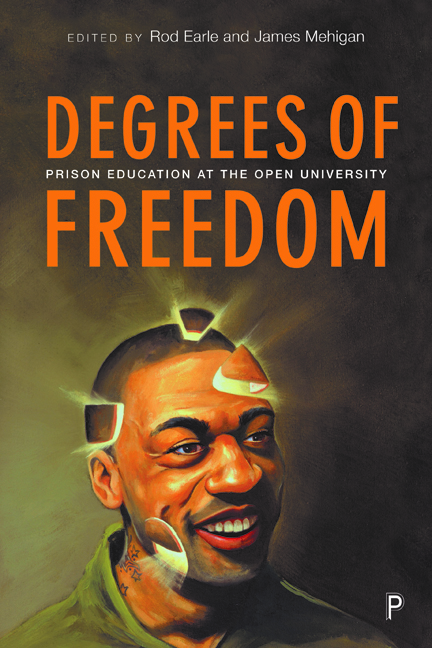Book contents
- Frontmatter
- Dedication
- Contents
- Notes on Contributors
- Acknowledgements
- 1 Openings and Introductions: Education for the Many, Prison for the Few
- 2 From Prisoner to Student
- Vignette 1 Choosing My Journey
- 3 Pioneers and Politics: Open University Journeys in Long Kesh During the Years of Conflict 1972–75
- Vignette 2 Avoiding the Mind-Numbing Vortex of Drivel …
- 4 A University Without Walls
- Vignette 3 Starting a New Chapter
- 5 Open Universities, Close Prisons: Critical Arguments for the Future
- Vignette 4 Out of the Abysmal
- 6 The Light to Fight the Shadows: On Education as Liberation
- 7 From Despair to Hope
- Vignette 5 Making my Commitment
- 8 Straight Up! From HMP to PhD
- 9 From Open University in Prison to Convict Criminology Upon Release: Mind the Gap
- Vignette 6 Message to a Prisoner
- 10 From the School of Hard Knocks to the University of Hard Locks
- 11 Becoming me with The Open University
- Vignette 7 Catching up with Kafka
- 12 From D102 to Paulo Freire: An Irish Journey
- Vignette 8 My Journey, My New Life
- 13 Ex-Prisoners and the Transformative Power of Higher Education
- Vignette 9 Prison Choices: Taking a Degree or Packing Tea?
- 14 What the OU did for me
- Appendix Study with The Open University
- Index
13 - Ex-Prisoners and the Transformative Power of Higher Education
Published online by Cambridge University Press: 11 March 2021
- Frontmatter
- Dedication
- Contents
- Notes on Contributors
- Acknowledgements
- 1 Openings and Introductions: Education for the Many, Prison for the Few
- 2 From Prisoner to Student
- Vignette 1 Choosing My Journey
- 3 Pioneers and Politics: Open University Journeys in Long Kesh During the Years of Conflict 1972–75
- Vignette 2 Avoiding the Mind-Numbing Vortex of Drivel …
- 4 A University Without Walls
- Vignette 3 Starting a New Chapter
- 5 Open Universities, Close Prisons: Critical Arguments for the Future
- Vignette 4 Out of the Abysmal
- 6 The Light to Fight the Shadows: On Education as Liberation
- 7 From Despair to Hope
- Vignette 5 Making my Commitment
- 8 Straight Up! From HMP to PhD
- 9 From Open University in Prison to Convict Criminology Upon Release: Mind the Gap
- Vignette 6 Message to a Prisoner
- 10 From the School of Hard Knocks to the University of Hard Locks
- 11 Becoming me with The Open University
- Vignette 7 Catching up with Kafka
- 12 From D102 to Paulo Freire: An Irish Journey
- Vignette 8 My Journey, My New Life
- 13 Ex-Prisoners and the Transformative Power of Higher Education
- Vignette 9 Prison Choices: Taking a Degree or Packing Tea?
- 14 What the OU did for me
- Appendix Study with The Open University
- Index
Summary
Introduction
In this chapter I analyse the narratives of ex-prisoners who entered higher education to transform their lives. My studies reveal many underexplored challenges related to the desistance process that are generally overlooked in the academic literature. These include how the lengthy and sometimes apparently unending process of selftransformation involved in desistance from crime is for the individual concerned. I was aware of this through my own experiences as a former prisoner who used education as an escape from a dysfunctional life, yet despite gaining a Bachelor's and a Master's degree, it still took many attempts to become an accepted member of society. After completing an Open University (OU) foundation level course in 1997 while in prison, I was able to begin an undergraduate degree after my release. Even so, I found myself trapped between my old world and the new world I was attempting to transition towards. This has become easier with the passage of time but even with the transformative benefits of a university education, employment, relationships and friendships analysed by desistance academics, none of these were able to shield me from the painful and prolonged experiences of social and psychological liminality. Liminality is a feeling of being between two worlds, neither fully part of one or the other. These feelings of mine resonated with the respondents in this study and although there are many transformative benefits of education, it soon became apparent that liminality is a major hurdle for desisters. Education can enable individuals to move beyond the liminal stage, but in many cases there is always conflict where the past and present collide.
There are many studies on prisoner education but there still remains a dearth of research and discussion about ex-prisoners in education. This can be attributed to them losing contact with education, but also because many ex-prisoners find themselves experiencing barriers (Pike, 2014). I interviewed 24 ex-prisoners (13 male/11 female) who had all entered higher education to transform their lives. Initially, my PhD study was heavily influenced by Anne Pike's (2014) Open University PhD study Prison-based transformative learning and its role in life after release, which found social rejection to be a major influence on the respondents’ self-esteem.
- Type
- Chapter
- Information
- Degrees of FreedomPrison Education at The Open University, pp. 195 - 208Publisher: Bristol University PressPrint publication year: 2019



